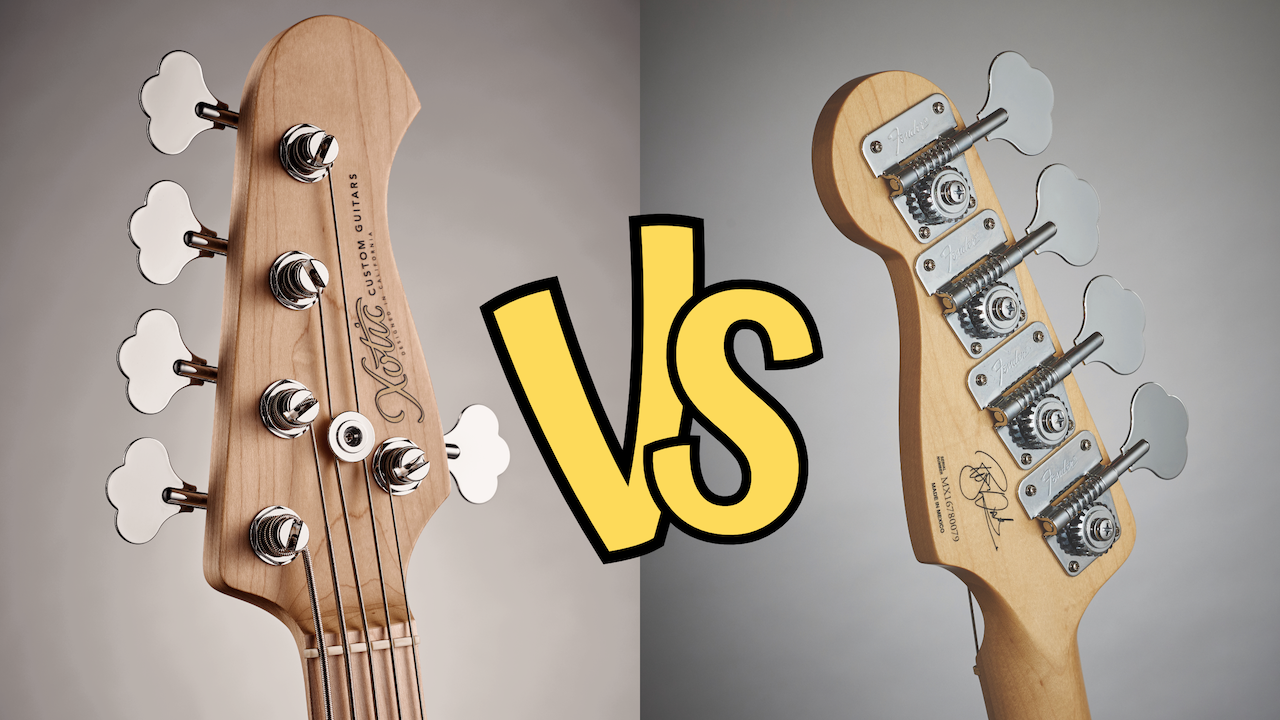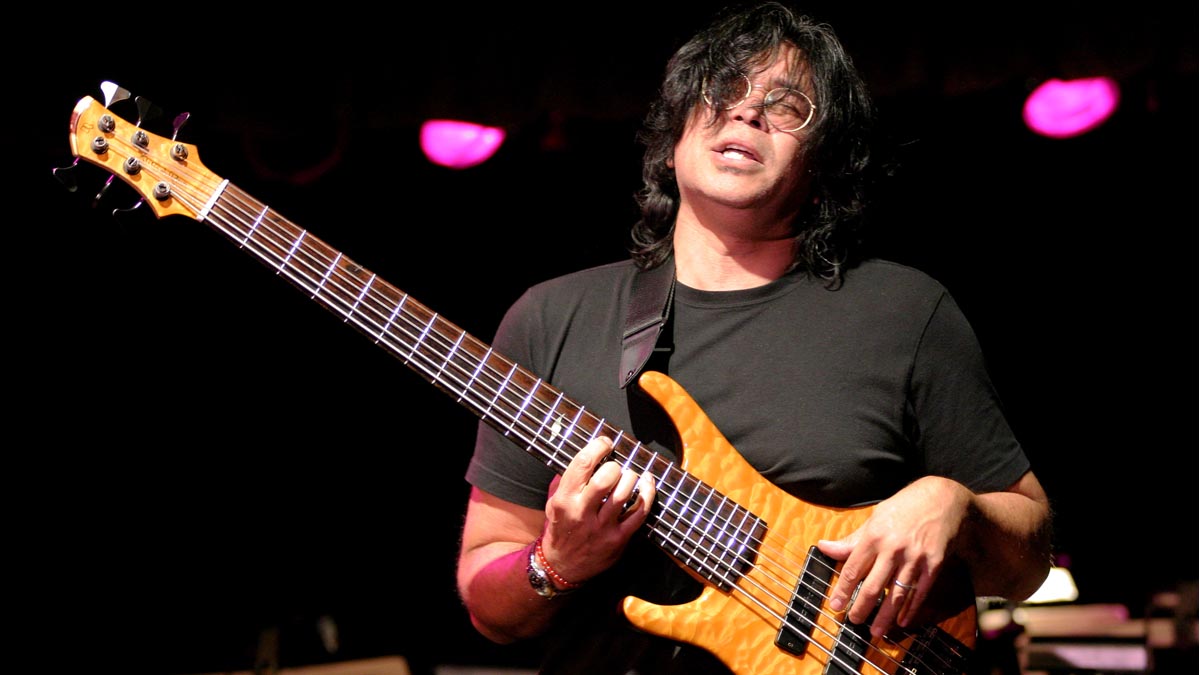Which is better: 4- or 5-string bass?
“Unless you’re Les Claypool, more than four is unnecessary!” Duff McKagan, Adam Blackstone and Glenn Hughes weigh in on the age-old debate

All the latest guitar news, interviews, lessons, reviews, deals and more, direct to your inbox!
You are now subscribed
Your newsletter sign-up was successful
The debate surrounding 5-string bass guitars has changed radically over the years. With increasing competition for low frequency real estate, bassists have often been forced to expand into the lower registers just to be heard. “When I had to emulate hip hop that was done with a keyboard or drum machine, the fifth string allowed me to hit those low tones," said Grammy-winning MD and bassist Adam Blackstone. "It really took over as a part of my overall sound.”
"I’ve never even played a 4-string," says Korn bassist Fieldy. "I’ve always played a 5-string. I just like that low, thick string."
Still, the majority of bass greats have all used a 4-string for their entire career without ever touching a 5-string. "I always feel slightly sorry for 5-string players," says Joel Graham, bassist with English thrash metal band, Evile. "I've noticed them onstage seeming a little unsure what to do with themselves. Four strings were always more than enough for my bass-playing heroes.”
So what does the world of bass actually think? We asked some of the biggest names in bass…
Duff McKagan – Guns N’ Roses
“Y’know, I see those 5-string basses around, and I feel sorry for the company who makes them, because they don’t know they messed up – you’re only supposed to put four strings on them! They should have counted more carefully – they’ve got some guy working down there who f****d up! I guess there’s a place for five strings, but not in what I do. There are guys who make you think, ‘It’s amazing that you can play that, it’s killer…’ and there are people who are a lot more talented than I am – four strings is gonna keep me busy for the rest of my life, you know?”
David Pastorius – Local 518
“I used to play five, but I like the tone of a four and I like what I do better out of a four. I’m not opposed to playing a five or a six; if anything, the extra strings make it easier. I was forced to learn the neck better when I went back to a four. I could stay in one spot all night with a five!"
Glenn Hughes – The Dead Daisies
“I’ve had all the 5-string, 6-string and 8-string basses; I’ve been the active bass thing – I’ve done all that. Now I’ve gone back to the passive 4-strings."
Daniel Pugsley – Skindred
"I always used 4-strings with Skindred, but recently I have been playing a lot more 5-string. It’s actually the first time I’ve owned one, and I’m really getting into it. I think because all my favourite players were always predominantly 4-string guys I naturally leaned towards that.”
All the latest guitar news, interviews, lessons, reviews, deals and more, direct to your inbox!
Jimmy Haslip – Yellowjackets (1977 - 2011)
“I played 4-string for a long time, then in the early 80s I got hip to the 5-string through Jimmy Johnson. I went to a show he was playing with Clare Fischer up in the Hollywood Hills, and after noticing he was playing a 5-string I went up and introduced myself and asked him questions about it.
"At the time I had an endorsement with Yamaha, so I approached them about building a 5-string, which they were somewhat opposed to. I kind of forced the issue, though, so they built me a 5-string out of a BB3000, which was a 4-string bass, so it had kind of a thin neck, but at least I had that low B string.

"So I got into that and toured with the Jackets with that bass, and before long Yamaha were getting tons of inquiries from people wanting to buy the new Yamaha 5-string bass! It forced them into manufacturing the BB5000, which was their first 5-stringer. Eventually I was looking for something to push the envelope and started noticing people playing 6-string, which I thought was kind of interesting. Being in the Yellowjackets with no guitar player opened the door for me to give it a shot."
Andy Sprakes – Failsafe
“I’ve tried 5-string basses before, and it didn’t feel right so I stuck with the 4-string. There’s nothing wrong with 5- or 6-string basses, but I think people who use them to their full potential are few and far between, so I wouldn’t recommend buying one just because it has more strings. So depending what you do with it, sometimes less is more!”
Cass Lewis – Skunk Anansie
“I used to use a 5-string for songs like ‘Charlie Big Potato’, but I prefer playing 4-string basses. I’ve always had that mindset. I got introduced to a company called Lakland that make 5-string basses and eventually I said, 'OK, OK, I will try one,' and it was the first time I had played a 5-string that was just as comfortable as playing a 4-string. It’s to do with the scale length of the B string; they just worked it out differently, but a good 5-string is a rare commodity."
Brian Marshall – Alter Bridge
“For recording, I only use a StingRay 5-string. It’s been a trial-and-error issue, but every record I’ve been on since [Creed’s 1999 album] Human Clay I’ve used that same bass.”
Andrew Levy – The Brand New Heavies
“I was put under a lot of pressure in the late 90s to get into playing a 5-string, because when you make an album the record company likes to remix certain tracks so that DJs can play the songs in clubs, and sometimes those remixes become the songs that everyone recognises so, live, you have to replicate that particular mix. If the bass went lower than that low E I had to pick up a 5-string. Recently I’ve been relearning a lot of the songs without using the low B string, but there are certain songs that I have to use it on, like You Are The Universe, because I wrote that on a 5-string, and Sometimes as well.”
Colin Edwin – Porcupine Tree
“I’ve never really felt the need for a 5-string, but I sometimes need to go down lower than E, so I’ve been detuning to drop D with a Hipshot for a long time. I really like the idea of having the bottom four strings of a 5-string on a 4-string bass, so I had one of my Spectors set up for that. I was really happy with it. I have a 5-string that I mess about with at home, but it doesn’t really fit with what we need.”
Adam Blackstone – Justin Timberlake, Nicki Minaj
“It’s the rumble of the low B that does it for me. Having that option gives me a different sense of how I play the bass. I’m definitely a guy who holds the low end down. When I had to emulate hip hop that was done with a keyboard or drum machine, the fifth string allowed me to hit those low tones, and it really took over as a part of my overall sound.”
Yves Carbone
"If you play 4-string bass, you’re categorised as a 4-string player – and if you play an extended-range bass, people look at you as if you’re an alien. When the first 5-string bass was introduced, I don’t think it was possible to hear the notes on the low-B string – but today everybody is used to hearing them, and so it’s not a problem.”
Rhys Lewis: The Blackout
“Why don’t I have a 5-string bass in my collection?’ So I went online to order one and then thought, ‘I can do better than five – I’ll get a 6-string bass!’ I don’t gig with it, I just practise, although I do love playing it. When you go from a bass neck the size of an anaconda’s throat you can fly around a 4-string jazz bass easily.”
Oteil Burbridge – Dead & Company
“I remember when Anthony Jackson was the only cat who had a 6-string bass. I didn’t even think it would be possible that I’d ever get one. When they did start making them I couldn’t afford. I would tune a guitar in 4ths to try and get the shapes. When I finally got a 6-string it all came together.”
Patrick Dahlheimer – The Gracious Few
"I don’t play 5- and 6-string bass, because I told myself that I wouldn’t move onto five or six strings until I’ve mastered four, and let’s say that I still have a long way to go. I play around with a few 5-strings at home but the family dogs usually start barking."
Thundercat
"Sometimes I play a 4-string bass just to make people feel comfortable. When they see me with a 6-string, I can tell they’d rather see me play a 4-string, because they think all bass players should play a 4-string! Every now and again I’ll play a 4-string, but for the most part the 6-string bass is where it’s at.”
Alain Caron – UZEB
“I first started working with a luthier in Montreal and we started making basses with longer necks, so I had a fingerboard that continued almost all the way up to the pickups. And then George Furlanetto called me and said, ‘I see that you are working on a new instrument. I may have something for you.’ And then he told me that with the type of neck I had I needed a 5-string. So he built me a 5-string with a high C, and I loved it. But I had been listening to Gino Vannelli playing synthesizer bass, and I wanted to have that low D, E and C# and low B, so I asked George to build me a 5-string with a low B too, so then I had both, but what I really needed was a 6-string, so he built me a prototype in 1983 or ’84 and I’ve been playing 6-string for over 20 years now.”
Gaz Spencer – The Ghost Of A Thousand
“I stick to a 4-string bass; if I need to go lower I downtune, which I think sounds heavier than the B string on 5- or 6-string basses. I reckon unless you’re Les Claypool, more than four is unnecessary!”
If you are thinking about getting yourself a 4-string or a 5-string bass guitar, check out our buyer’s guide.

Nick Wells was the Editor of Bass Guitar magazine from 2009 to 2011, before making strides into the world of Artist Relations with Sheldon Dingwall and Dingwall Guitars. He's also the producer of bass-centric documentaries, Walking the Changes and Beneath the Bassline, as well as Production Manager and Artist Liaison for ScottsBassLessons. In his free time, you'll find him jumping around his bedroom to Kool & The Gang while hammering the life out of his P-Bass.
